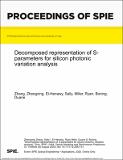Decomposed representation of S-parameters for silicon photonic variation analysis
Author(s)
Zhang, Zhengxing; El-Henawy, Sally I.; Miller, Ryan; Boning, Duane S
DownloadPublished version (1.042Mb)
Publisher Policy
Publisher Policy
Article is made available in accordance with the publisher's policy and may be subject to US copyright law. Please refer to the publisher's site for terms of use.
Terms of use
Metadata
Show full item recordAbstract
© 2020 SPIE. Silicon photonics offers great potential for monolithic integrated photonic and electronic components using existing integrated circuit fabrication infrastructure. However, methods to analyze the impact of IC process variations on performance of photonic components remain limited. Statistical models based on either simulations or experiments that quantify the effect of these variations are necessary to achieve high-yield manufacturing. In order to cope with the non-linearity in the S-parameters of photonic device components and circuits, non-linear parameter fitting is often used prior to statistical modeling, e.g., rational polynomial fitting of ring resonator responses. The conventional approach treats the amplitude and phase of the S-parameters separately in the fitting process; however, this can be problematic when the behavior of the S-parameters becomes complicated under the variations, since it neglects the strong correlation between amplitude and phase. We present a novel representation of S-parameters that decomposes the complex-numbered S-parameters into several components each having a simple response that does not require non-linear parameter fitting, and that supports subsequent statistical analysis. We apply the proposed S-parameter decomposition method to Ysplitters with imposed line edge roughness variations. In contrast to the difficulty of the conventional amplitudephase representation, the decomposed representation shows improvement in statistical modeling of variation ensembles, e.g., using principle component analysis. The method can be extended to other photonic components and circuits with other process variations, to help quantify the effect of process variations for statistical analysis, and to help designers predict and optimize photonic component performance and yield.
Date issued
2020-08Department
Massachusetts Institute of Technology. Department of Electrical Engineering and Computer ScienceJournal
Proceedings of SPIE - The International Society for Optical Engineering
Publisher
SPIE-Intl Soc Optical Eng
Citation
2020. "Decomposed representation of S-parameters for silicon photonic variation analysis." Proceedings of SPIE - The International Society for Optical Engineering, 11484.
Version: Final published version